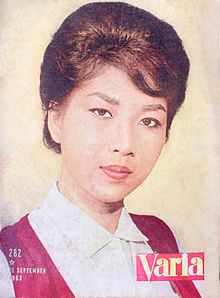Titiek Puspa
| Titiek Puspa | |
|---|---|

Puspa, cover of Varia (1963)
|
|
| Background information | |
| Birth name | Sudarwati |
| Born |
1 November 1937 Tanjung, Dutch East Indies |
| Genres | Pop |
| Occupation(s) | Singer, actress, song writer |
| Years active | 1954–present |
Sumarti (born 1 November 1937), better known by her stage name Titiek Puspa, is an Indonesian singer and songwriter. Rolling Stone Indonesia has selected two of her songs as some of the best Indonesian songs of all time.
Puspa was born with the name Sudarwati in Tanjung, South Kalimantan on 1 November 1937 to Tugeno Puspowidjojo and Siti Mariam. Her family later changed her name to Kadarwati and then finally Sumarti. As a child, she wanted to be a kindergarten teacher. However, after winning several singing competitions she decided to become an entertainer, making the decision around age 14. Her parents forbade her from doing so.
After winning the Radio Republik Indonesia singing competition in Semarang, Central Java, Puspa was asked by Sjaiful Bachri of the Jakarta Symphony Orchestra to sing for them. After her performance of Ismail Marzuki's song "Chandra Buana", the group elected to keep her as their regular singer. She left the orchestra in 1962. Her stage name was chosen by President Sukarno during the 1950s.
In 1957 Puspa married Zainal Ardhy, a Radio Republik Indonesia employee. By 1963 they had two daughters. During this period Puspa began to study songwriting, learning from her husband. Aside from singing and songwriting, Puspa also acts.
In 2009, Puspa was diagnosed with cervical cancer. After several months of treatment, including two months of chemotherapy at the Mount Elizabeth Hospital in Singapore (where she wrote 61 songs), she was declared to be free of cancer. She credits her prayer and meditation in the hospital for her success at fighting cancer.
In a 2008 interview with Bruce Edmond of The Jakarta Post, Puspa stated that "[s]ongs are my medicine, my vitamins, they make my life better."
Puspa has been described as "the grand dame of Indonesian entertainment". In 1963 the Indonesian variety magazine Varia described her name and voice as "inseparable", writing that listeners would stop their activities to focus on her songs when played on the radio.
...
Wikipedia
